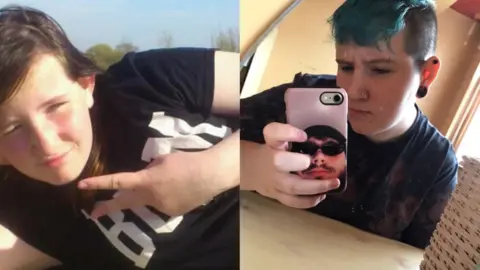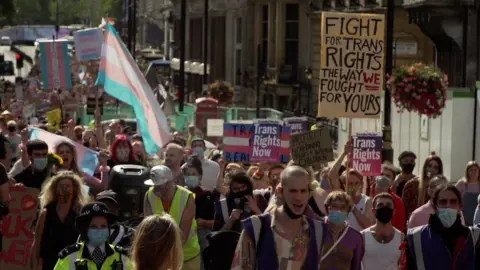'Transphobic bullies nearly cost me my life'
At the age of 15, Tyler tried to take his own life after he was teased and abused for being transgender.
The student from east London, now aged 19, said bullies would follow him home and throw things at him after he began identifying as male in 2015.
"I experienced a lot of hate, a lot of fear. There was a couple of times where I was followed home and a couple of times where I could feel things being thrown at me," he said.
"I did not have any desire to be alive at all and I was hospitalised after a number of suicide attempts."

Tyler's abuse came amid a surge in transphobic hate crimes in London.
In 2011, 59 transphobic attacks were reported to the Met Police. By 2015 the number of annual reports increased to 151, and by the end of 2019, 283 attacks had been recorded in a year.
The numbers included physical and verbal attacks as well as incitement to hatred.
Specialist officers from the Met Police hate crime unit said they believed the figures reflected fewer hate crimes than were actually taking place.
Commander Melanie Dales said a lot of hate crime victims feared coming forward.
"The numbers are not reflective of the amount of actual transgender hate crime that there is," she said.
"I can understand why people may be reticent to come forward, but not maybe because of the personal experience they've had with the police but maybe because of something they've seen on television or they've heard.
"We're trying to do our best so that when people do come forward, they get to speak to someone that really does understand their issues."
Tyler's mother, Johanna, who watched her child struggle with transphobic abuse, urged similar victims to come forward.
"As a parent, I've seen first-hand how common transphobic abuse is," she said.
"My son experienced such frequent abuse and threats, I'd say on a daily basis for more than two years - people in the street, people on buses, kids at his school and then college, even people he'd known when he was younger tracking him down on social media - calling him names and threatening him.
"It massively impacted his mental health. I think the police now take this much more seriously and its important to report this as soon as it happens."

Types of transgender abuse:
- Deadnaming: Referring to a transgender person by their birth name, even after they have specified their chosen name
- Misgendering: Where someone is referred to using a pronoun or form of address that does not correctly reflect the gender with which they identify
- Doxing: The publishing of private or identifying information about a particular individual without their consent
- Outing: The disclosing of a person's gender identity or sexual orientation without their consent.
Source: Galop - LGBT+ charity

Leni Morris, CEO of the LGBT+ anti-hate charity Galop said most transgender people experienced at least one form of hate crime every year.
"Trans people are suffering very high levels of physical and sexual violence," she said.
"We also have cases where people are blackmailed about their identity. We know of examples where people have searched for personal information about people and threatened to, or actually published private information about people online.
"There is a practice such as deadnaming and misgendering. Treating trans people as if they're diseased. It's a really wide spectrum of the kinds of things trans people are experiencing right now.'"
The Met said it was appointing 250 advisers specialising in LGBT+ hate crime who would be trained to recognise the issues faced by London's transgender community.

After several years on hormone blockers and testosterone, Tyler now has his Gender Recognition Certificate, which means he has satisfied government criteria to have his true gender legally recognised.
He will soon have an operation to remove his breast tissue and later a hysterectomy.
After dropping out of school before his GCSEs, he has been studying at college to try and catch up on the education he missed out on.
"I'm just not going to not live my life. I'm not going to not live authentically for other people," he said.
"Because we live among everyone else, we breathe the same air as you, we're not a different part of the human race, we're just like everyone else."
If you have been affected by the issues raised in this article, the BBC Action Line website has details of organisations which can provide support and advice.
